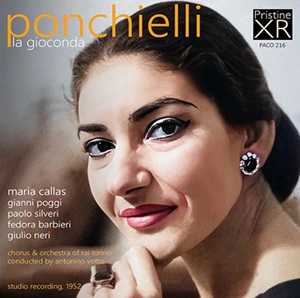
Amilcare Ponchielli (1834-1886)
La Gioconda – opera in four acts (1876)
La Gioconda: Maria Callas (soprano); Enzo Grimaldi: Gianni Poggi (tenor); Barnaba: Paolo Silveri (baritone); Laura Adorno: Fedora Barbieri (mezzo-soprano); Alvise: Giulio Neri (bass); La Cieca: Maria Amadini (mezzo-soprano)
Chorus & Orchestra of RAI/Antonio Votto
Score & libretto available for download online
rec. 1952, RAI Auditorium, Turin
Ambient Stereo XR Remastering
Pristine Audio PACO 216 [3 CDs: 166]
This recording, originally made by Callas when she was under contract to Cetra, has previously been reviewed three times (review; review; review) twenty years ago by different colleagues on MusicWeb when it was issued on CD by Regis and Naxos, and I also assessed it in my survey of La Gioconda.
My first task as reviewer was to compare the sound on this new remastering into Ambient Stereo with the discs provided in the big Warner box La Divina Maria Callas in all her roles; my second was to revisit to see if my response to it had changed since I assessed it in my survey.
Dealing first with the sound, I remarked in my survey that “[t]he relatively poor sound quality and rather second-rate cast – apart from Callas, of course – long disinclined me to listen to Callas’ first recording when there were so many good alternatives.” I have to say that Andrew Rose has once again made an enormous improvement on the original mono issue, bestowing upon it a warmth, depth and breadth which make it largely indistinguishable from any good 1950s stereo recording. There is still a hint of overload in ensembles and forte passages, but by and large the enhancement is remarkable. I started off comparing the Warner version with Pristine’s track by track, but soon settled upon listening to this new incarnation as demonstrably superior.
Regarding the singing and playing, let me again quote from my survey,: “I have always favoured [Callas’] later account with the same conductor, insofar as she is still in great voice, but it is recorded in stereo with a cast superior to this 1952 mono studio version.“ That sonic advantage of the second version is considerably minimised by Pristine’s remastering, which also elevates and enhances the singers’ contributions in the earlier recording, confirming my impression that there are fewer qualitative differences between the two accounts than I had recalled.
Indeed, I remarked in my survey that on returning to this set – and here I quote my findings at greater length – I found it “more rewarding than I had remembered. The differences in Callas’ interpretation are minimal – but so they are in her singing, in purely vocal terms as opposed to interpretation. Even in 1952 some top notes flapped a bit, but that’s a small price to pay in exchange for the intensity of her interpretation. She leaves even worthy rivals like Tebaldi in the dust, as much as I like her recording with Bergonzi. Votto directs with great élan in both, and his orchestra in 1952 is very fine, even if his chorus is a bit rustic. Her fellow singers are more variable. Silveri – largely forgotten today but a major singer in that era – has a big, husky baritone and sings with great confidence, but his characterisation is rather unvarying and monochrome compared with more nuanced baritones such as Milnes and Merrill. Maria Amadini is a true contralto, but is rather quavery up top and has a peculiarly hooded tone; Companeez is better in 1959. Neri’s huge bass is impressive but unwieldy and he is definitely less elegant than Ivo Vinco. Barbieri is similarly generically impressive, but Cossotto gave one of the performances of her life for Votto in 1959. The real blot on the recording is the bleaty, effortful and lachrymose Poggi who can sing the notes but makes Pier Miranda Ferraro sound subtle. Otherwise, this is mostly very enjoyable, but I still cannot see why anyone would favour it over the later recording.”
I am this time around more impressed by nearly all the singers, especially Silveri and Neri. And it even presents Poggi – whose effortful and lachrymose contribution has, as far as I am concerned, always been something of a blot on the set – in a better light, even if “Cielo e mar” is still unattractively bawled. Otherwise, the improved sound allows us to appreciate more fully, for example, the sheer sumptuousness of Neri’s enormous bass. We can now better hear the subtleties of every singer’s delivery – not that subtlety is the keynote of Barbieri’s triumphantly OTT Laura – but what a cat-fight between her and Callas.
Whereas in the past, I have rarely felt inclined to choose to listen to this over the later recording, I can now see myself turning more readily to this Pristine release, now that the sound has been so triumphantly enhanced.
The three discs are presented in a neat, slim cardboard gatefold package – but once again, Pristine’s choice of cover photograph is rather odd; it is clearly not the Callas of the pre-weight-loss era when this was recorded.
Ralph Moore
Availability: Pristine ClassicalOther cast:
Zuàne/Un Pilota: Piero Poldi (bass)
Isèpo: Armando Benzi (tenor)


















